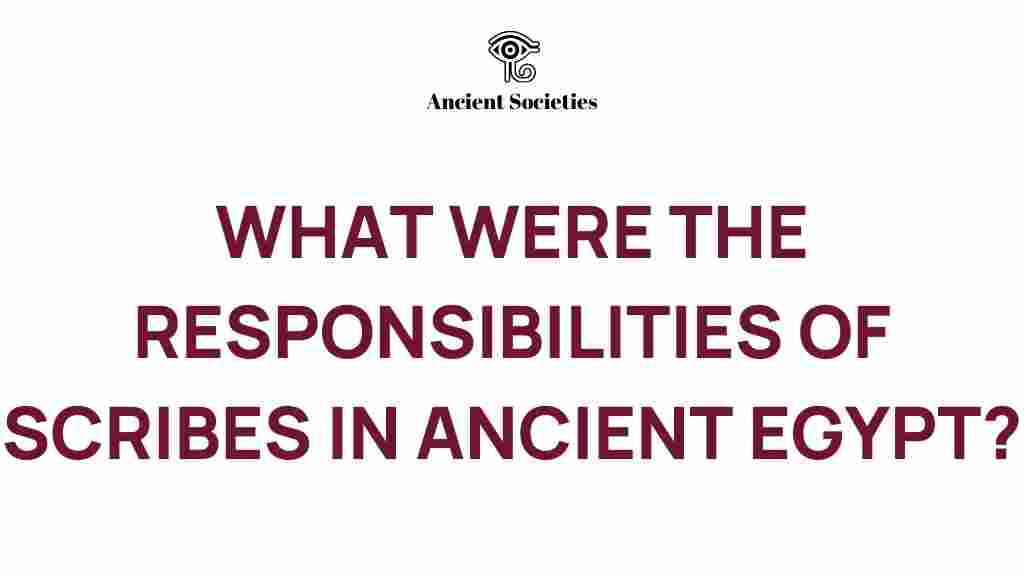Unveiling the Secrets: The Pivotal Role of Scribes in Ancient Egypt
In the rich tapestry of ancient Egypt, few professions hold as much significance as that of the scribes. These skilled individuals were not just mere record-keepers; they played a vital role in the administration, culture, and history of one of the most fascinating civilizations in human history. This article will delve into the responsibilities of scribes, their impact on literacy, and how they shaped the bureaucratic landscape of ancient Egypt.
The Historical Context of Scribes in Ancient Egypt
The role of scribes in ancient Egypt can be traced back to the early dynastic periods, around 3000 BCE. Initially, writing was a tool for recording transactions, religious texts, and historical events. As the civilization progressed, the demand for written documentation grew, leading to the establishment of a professional class of scribes.
Scribes were typically young men from wealthy families who received their education in temples or special schools. They were taught hieroglyphics, the sacred script of ancient Egypt, as well as hieratic script, which was a cursive form of writing used for everyday purposes. This education was rigorous and laid the foundation for their future responsibilities.
Responsibilities of Scribes in Ancient Egypt
The responsibilities of scribes were diverse and crucial to the functioning of ancient Egyptian society. Here are some of their key duties:
- Record Keeping: Scribes were responsible for documenting everything from tax collections to military campaigns. Their records ensured that the government could function smoothly.
- Administrative Duties: Many scribes worked in various administrative capacities, assisting pharaohs and officials in managing the affairs of the state.
- Legal Documentation: They played a significant role in creating and maintaining legal documents, contracts, and agreements, making them essential to the legal system.
- Religious Texts: Scribes often transcribed sacred texts and inscriptions, preserving the religious beliefs and practices of ancient Egypt.
- Education: Some scribes took on the role of teachers, educating the next generation of scribes and promoting literacy in ancient Egypt.
The Impact of Scribes on Literacy and Culture
The profession of scribes significantly influenced literacy rates in ancient Egypt. As the demand for written communication grew, so did the need for education. Scribes were among the few literate individuals in society, and their expertise elevated the status of writing as a revered skill. Here are some ways scribes impacted literacy and culture:
- Promotion of Literacy: Scribes were instrumental in promoting literacy among the elite and the administrative class, ensuring that the knowledge of writing was not confined to a select few.
- Cultural Preservation: Through their writings, scribes preserved the culture, history, and religious beliefs of ancient Egypt, allowing future generations to understand their heritage.
- Artistic Expression: The work of scribes was not just functional but also artistic. The beauty of hieroglyphics and the intricate designs of written documents reflected the aesthetics of ancient Egyptian culture.
The Training and Education of Scribes
Becoming a scribe was not an easy feat. The training involved several stages and a deep commitment to learning:
- Initial Education: Young boys, often from affluent families, began their training at a young age, usually around 5 to 6 years old. They attended a school known as a “house of life,” typically located in temples.
- Learning Hieroglyphs: The curriculum focused on the study of hieroglyphics and hieratic script. Students practiced writing on papyrus, stone, and other materials.
- Moral and Ethical Training: Besides writing, students learned about the moral and ethical responsibilities of being a scribe, including the importance of accuracy and integrity in their records.
- Advanced Studies: Those who excelled could pursue further education in mathematics, astronomy, and law, making them even more valuable within the administrative system.
Challenges Faced by Scribes
Despite their esteemed status, scribes faced numerous challenges in their profession:
- Political Turmoil: Changes in leadership or political instability could jeopardize a scribe’s position, as new rulers might favor different administrators.
- Accuracy Demands: The pressure to maintain accurate records was immense. Errors could lead to severe consequences, including legal repercussions.
- Limited Access to Education: While scribes held a privileged position, access to education was still limited to those of certain social classes, preventing wider literacy.
The Legacy of Scribes in Ancient Egypt
The legacy of scribes in ancient Egypt is profound. Their contributions to administration, literature, and culture have left an indelible mark on history. Here are some aspects of their lasting impact:
- Preservation of History: Scribes documented historical events, providing invaluable insights into the past through texts and inscriptions that remain to this day.
- Influence on Modern Writing: The writing systems developed by scribes laid the groundwork for future scripts and influenced the development of written language in other cultures.
- Understanding of Ancient Culture: The works of scribes allow scholars and historians to explore the social, political, and religious life of ancient Egypt, enriching our understanding of its civilization.
Conclusion
In conclusion, the role of scribes in ancient Egypt was pivotal and multifaceted. From their responsibilities in administration to their contributions to literacy and cultural preservation, scribes were essential to the functioning and legacy of this great civilization. Their work not only documented the past but also shaped the future of written communication. Understanding the significance of scribes helps us appreciate the complexities of ancient Egyptian society and the profound influence of writing on human history.
For more information on the fascinating history of ancient Egypt, you can visit Ancient Egypt to explore more about this incredible civilization.
If you’re interested in the education and training of scribes in ancient Egypt, check out our detailed guide on scribal education and its historical context.
This article is in the category History and created by AncientSocieties Team
